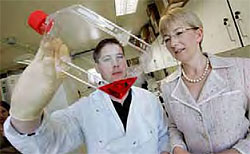Taking Research and a Country to New Levels of Excellence
Resource type: Grantee Story

“Look, frankly you’ve got to invest in research,” were Founding Chairman Chuck Feeney’s words in 1998 to Ireland’s then Prime Minister Bertie Ahern, when Mr. Feeney urged him to have the government stop dragging its feet on a revolutionary proposal to co-fund a major initiative, called the Programme for Research in Third Level Institutions (PRTLI).
This initiative, a series of bold investments in the country’s seven universities and the Royal College of Surgeons, has created a highly competitive strategic research environment of international quality. PRTLI also gave a significant boost to the economy. Mr. Feeney was the driver because of his conviction that Ireland’s future prosperity depended on its ability to create new knowledge.
“It would be difficult to exaggerate how bleak the Irish research landscape looked in 1996,” said Dr. Hugh R. Brady, president of the University College of Dublin. “It has been totally transformed, thanks in large part to the catalytic initiative shown by Atlantic.”
Tom Mitchell, an Atlantic Board member and former provost of Trinity College Dublin, said: “PRTLI is Chuck’s biggest legacy. It is a model of how a foundation can combine with government and use its leverage to change policy. This is social change in a very significant way.”
Even more astonishing is that Atlantic, which had already made major contributions to renew Ireland’s university infrastructure, mounted such large-scale initiatives in absolute secrecy, a strict requirement during the foundation’s period of anonymity. Only a handful of people knew the source of the “matching private funds.”
Atlantic’s €178 million investment in PRTLI has leveraged more than €1.2 billion in investments from the Irish government.
The competitive nature of the PRTLI instils a culture of strategic research planning at all eight institutions, promoting inter-institutional collaboration on multifaceted projects and ensuring that universities put forth only their best projects. The PRTLI strengthens the linkage between research and education, which distinguishes it from more conventional research funding. Academic institutions that participate in the PRTLI – not the government or Atlantic – select their own research strategies.
PRTLI has provided for approximately 100,000 square metres (1.1 million square feet) of new research facilities, 46 research institutes or programmes, 1,000 research positions and 1,600 new postgraduate positions.
Atlantic invested in the first three funding cycles a total of €178 million ($262 million), equivalent to 16 per cent of the government’s contribution of more than €1.2 billion ($1.6 billion) through five cycles that continue to this day.
The foundation also invested £26 million ($39.7 million) for a similarly successful programme, called SPUR or Support Programme for University Research, in Northern Ireland. For these reasons, “when the history of Irish higher education is written, the name of Chuck Feeney will hold an honourable place,” according to Dr. Brady.
 Giving While Living: Marking 30 Years of Achievements: 1982–2012
Giving While Living: Marking 30 Years of Achievements: 1982–2012
> Read more stories of impact in our 30th anniversary publication
In addition to the Royal College of Surgeons, the universities that have received Atlantic-PRTLI grants are Dublin City University, University College Cork, University College Dublin, University of Limerick, National University of Ireland Galway, National University of Ireland Maynooth and Trinity College Dublin. All-Ireland Institute for Hospice and Palliative Care, Health Service Executive, Irish Association for Palliative Care, Marymount Hospice, Milford Care Centre and St Patrick’s Hospital, Cork are also Atlantic grantees for palliative care.
In Northern Ireland, Queen’s University of Belfast and the University of Ulster are Atlantic grantees.